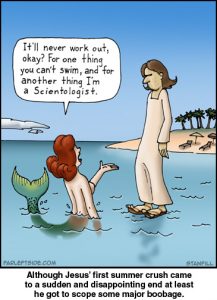
I suspect [ETA: strongly suspect] Jesus originated as a theological and allegorical creation, that he was “a myth” if you like. I do not know it. I cannot prove it. But I can see some very good arguments in favour of this proposition. I can also see some very good reasons to question the standard methodology of mainstream scholars based on the assumption that Jesus was a historical figure. And the same questions I raise about this methodology also open up questions about the standard mainstream arguments for the historicity of Jesus.
But I have never thought of myself as “a mythicist” because that sounds to me like I am entrenching myself in a position that I will defend at all costs.
I have posted this sort of remark before, but given that James McGrath and others continually label me “a mythicist”, I will repeat it once more. I do not see the point of “defending” a “mythical Jesus” position.
That is not what historical inquiry is about.
Would any scholar bother to spend a career arguing for or against a historical or mythical Socrates? Some mainstream scholars really do question the historical existence of Socrates, but no-one calls them “Socrates mythicists”. It is a ludicrous proposition when we see it in the context of nonbiblical studies. The existence of Socrates has been occasionally raised as a minor side-point that is really quite irrelevant to the real historical questions about the origins and nature of early Greek philosophy.
My interest is, to repeat, in exploring the origins and nature of early Christianity.
I think that this historical inquiry has been held captive by mainstream NT historical methods that begin with the presumption that the narrative of Gospels-Acts is in some sense related to real events. What I have questioned is the rationale for this assumption. Continue reading “Why I am Not a “Mythicist”, and why I challenge mainstream methodology”
